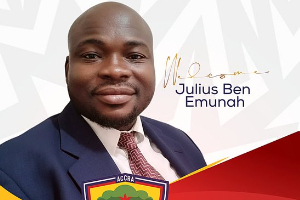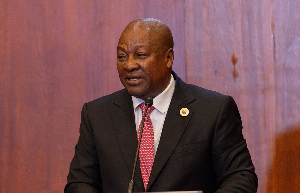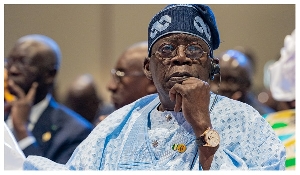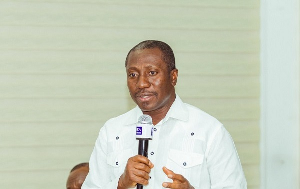Elmina (Central Region) 15 July ?99
Scientists at the laser and fibre Optics Centre (LAFOC) of the University of Cape Coast (UCC) have been urged to measure emission levels from various fuels for thermal generation.
This will provide the required scientific evidence to guide policy decisions on choice of fuel as the world enters a new era of increasing thermal power generation.
Mr. Tsatsu Tsikata, chief executive of the Ghana National Petroleum Corporation (GNPC), made the call when he addressed the closing session of an International workshop on "Combustion diagnostics and optical techniques" at Elmina on Saturday.
The workshop, was geared towards fostering collaboration between industries and research institutions, on the transfer of scientific-based technology.
It was organised by the International Centre for High Science and Technology (ICS) based in Italy in conjunction with other local research institutions.
Sixty industrialists and researchers from Ghana, the Sudan, Nigeria, Morocco, Rwanda and Senegal participated.
Mr. Tsikata was happy that the workshop had been held at a time when the importance of natural gas-fired energy has become obvious throughout the world.
It was also at a time when Ghana has experienced a serious shortfall in energy from dependence on hydroelectric power.
To guide policy decisions on fuel choice, will therefore be of value not only to Ghana, but the whole of Africa, as various projects are being undertaken to address current energy shortfalls.
Mr. Tsikata stressed the need to monitor activities of oil industries and transform the emission into energy, specifically in Nigeria where billions of cubic feet of natural gas are flared daily during oil production.
He noted that the assessment of emissions from oil refineries and power plants would also assist the Environmental Protection Agency in assessing environmental impacts from various combustion processes.
The Chief Executive hoped that deliberations at the workshop would contribute to the development of the African continent.
He stressed that such experts should be given credence to motivate them and to help bridge the science and technology gap between the rich and poor nations.
The participants expressed concern about the lack of adequately trained manpower and insufficient facilities within the public and private sector for atmospheric pollution studies.
In a resolution, they asked that scientists, engineers, and technical personnel should be trained for the establishment of local expertise in combustion, emission control and laser and optical techniques
General News of Thursday, 15 July 1999
Source: --












